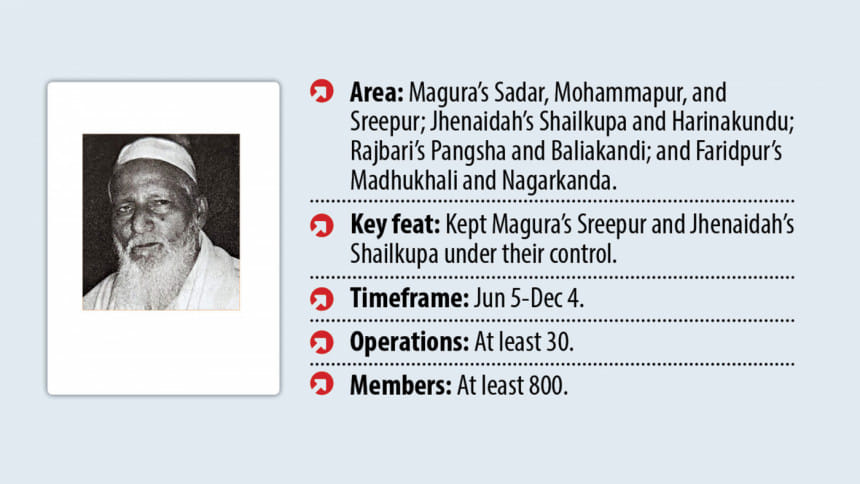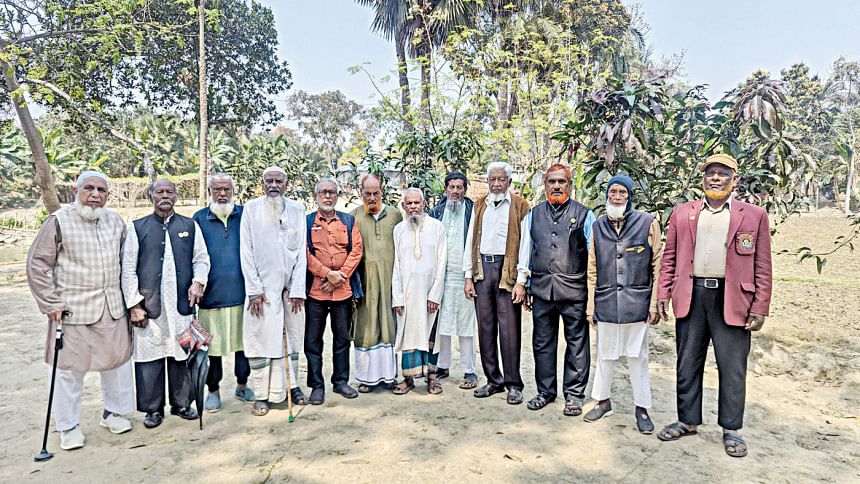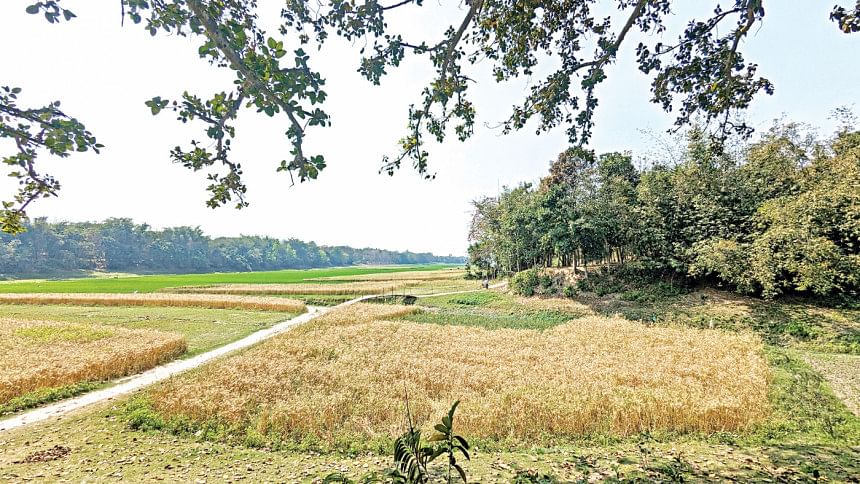Regional Resistance: Sreepur Bahini of Magura

Akbar Hossain, the chairman of Sreekol union parishad in Magura's Sreepur upazila, led a force to be reckoned with against the invading Pakistani army during the Liberation War. While officially named Sreepur Bahini, this force was known to locals as Akbar Bahini.
As an acknowledgement of Sreepur Bahini's contributions, Major Abul Manjur, commander of Sector 8, presented Akbar with a certificate of recognition in October 1971.
Initially consisting of a couple dozen members armed with six rifles, the Sreepur Bahini expanded significantly during the course of the war, eventually numbering over 800 freedom fighters.
Akbar Hossain himself wrote a book titled "Muktijuddhe Ami O Amar Bahini" chronicling the activities and heroism of Sreepur Bahini. Before joining the war, Akbar Hossain served in the Pakistan Air Force, enlisting in 1951. However, unable to stand how badly Bangalees were treated there by Pakistanis, he resigned from the service after three years. Later in 1965, he was elected chairman of Sreekol union.
FORMATION
On March 28, an upazila-level Sangram Parishad was formed in Sreepur under the leadership of Akbar Hossain. Other members of the committee included Molla Nabuat Ali, Khandaker Nazayet Ali, and Khandaker Sujayet Ali.
As per the decision of the Sangram Parishad, a training camp was set up at the Ansar camp near Nomani Maidan in Magura. The majority of students who went to this training camp were from Sreepur College.
Towards the end of April, anticipating the arrival of the Pakistani army in Magura, the freedom fighters led by Akbar arrived in Sreepur armed with six rifles, walkie-talkies, and ammunition acquired from the Magura Ansar camp.
This marked the formation of Sreepur Bahini, Akbar writes in his book.
Molla Nabuat Ali was made the deputy commander, while Khandaker Nazayet Ali was the co-commander. Nazayet Ali died on December 31, 1976, while Nabuat Ali died at the age of 83 on February 10, 2022.

DUAL-THREAT
At the start of the war, the freedom fighters of Sreepur Bahini were confronted with a dual threat: the Pakistani army and local criminal elements. While the presence of dacoits, bandits, and Bihari criminals, who sided with Pakistan, in the Magura and Faridpur areas had been a concern even prior to the war, their menace intensified following the outbreak of war. Taking advantage of the disruption in administrative activities, these criminals engaged in rampant looting, killing, and even rape.
The elimination of several dacoit gangs significantly boosted the reputation of Sreepur Bahini in the surrounding areas. This newfound recognition attracted a surge of new members, including students, youth, and individuals from the Bengal Regiment, East Pakistan Rifles, and Ansar. A training camp was set up in Tupipara village for the new recruits.
The presence of Sreepur Bahini was no longer confined to the Sreepur region and extended to Shailkupa and Harinakundu in Jhenaidah; Pangsha and Baliakandi in Rajbari; and Madhukhali and Nagarkanda in Faridpur, Akbar writes in his book.

MAJOR OPS
A notable operation by the force was the capture of Shailkupa Police Station in Jhenaidah. On the night of August 9, a large contingent of freedom fighters led by Akbar attacked the station.
According to Ismail Hossain, a freedom fighter who participated in the operation, in the face of resistance from the Pakistani forces, the fighters retreated and regrouped, later renewing their assault after a brief pause.
Ultimately, the police station fell under the control of the Sreepur Bahini, resulting in the surrender of at least 30 individuals, including police personnel and Razakars.
The freedom fighters recovered 57 rifles and 4,000 bullets from the police station. The capture of the station solidified the position of Sreepur Bahini in Shailkupa.
According to the book, during the war, Sreepur Bahini fought in over 30 battles, including the battle of Alfapur, the battle of Nakol, the battle of Kajli, attacks on the Sreepur Police Station, the Baliakandi Police Station, the Ichakhada and Binodpur Razakar camps, and the Magura Ansar Camp.
The battle of Alfapur in Jhenaidah's Shailkupa was one of the most successful, where 55 Pakistani soldiers were killed on August 4.
After the Sreepur Bahini's capture of Shailkupa Police Station, the Pakistani army began advancing towards Sreepur. To resist the incoming enemy forces, the Sreepur Bahini set up defensive perimeters at Sarainagar and Alfapur.
Unable to pass through Sreekol, the Pakistani army was forced to advance along both sides of the Kumar river, leading to intense encounters with the freedom fighters at Mingram and Sarainagar. At one stage, as the Pakistani army entered the Alfapur canal via the river, they were caught in a crossfire.
Kamruzzaman Lal, a freedom fighter of Sreepur Bahini, said, "We were on one side of the canal while another group led by Kamruzzaman Khusu was on the other side.
"As soon as the Pakistanis entered the canal, the Khusu group first started firing. Then we joined from our side, catching the enemy in a crossfire. They didn't think they would be under such a terrible attack."
OTHER NOTABLE OPS
According to the book, Sreepur Bahini recaptured Sreepur Police Station and appointed Akram Hossain as its officer in charge in August. They managed to keep hold of the station briefly before it was taken over by the Pakistanis. The force reclaimed the station for the last time on November 19.
On October 10, more than 500 Pakistani soldiers attacked the Tupipara camp of Sreepur Bahini.
Tipped off, the freedom fighters had earlier left the camp and taken position on the other side of the river. When the Pakistani army attempted to cross the river, six Pakistani soldiers were shot and killed by the freedom fighters.
On October 13, acting on a tip-off about an incoming contingent of enemy soldiers, a group of freedom fighters divided into two groups and set an ambush near Mashalia Mosque.
Around an hour later, when a group of Pakistani soldiers were heading towards Langalbandh from Sreepur Police Station, one group of freedom fighters initiated a surprise attack, firing upon the unsuspecting Pakistani soldiers. As the Pakistani army attempted to retreat, they were caught in a crossfire at the hands of the other group of freedom fighters. The fierce engagement resulted in the deaths of 14 Pakistani soldiers, including six officers.
On November 24, eight Pakistani soldiers, including a colonel, were killed in a surprise attack at Nakol Bazar.
Freedom fighter Delwar Hossain, who participated in the operation, stated, "On the night of the operation, we set an ambush with positions on both sides of the canal near the market. Around 7:00pm, we launched an attack as a convoy of Pakistanis approached from the direction of Langalbandh. Although the first car managed to pass through, the second car was not so fortunate.
"Everyone in the Jeep, including the Pakistani colonel, was killed. The Pakistani soldiers in the last military van then opened fire on us. However, after about one and a half hours of fighting, they retreated."
Translated and edited from Bangla by Subrata Roy.

 For all latest news, follow The Daily Star's Google News channel.
For all latest news, follow The Daily Star's Google News channel. 



Comments